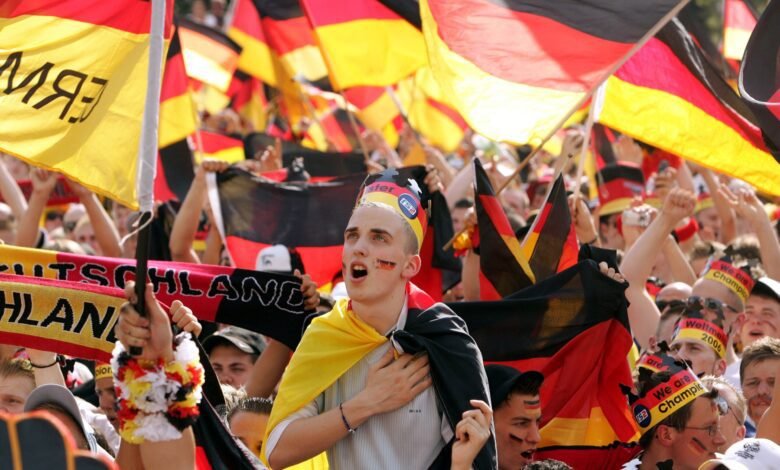Why Germany’s patriotic fervor at the 2006 World Cup is unlikely to be repeated at Euro 2024

BERLIN (AP) — When Germany hosted the 2006 World Cup, it triggered an unexpected explosion of national pride across the…
BERLIN (AP) — When Germany hosted the 2006 World Cup, it triggered an unexpected explosion of national pride across the country. For many Germans, it was the first time they felt they could wave the flag without the weight of the country’s dark past.
As Germany prepares to host another major football tournament, the European Championship, it is difficult to imagine such scenes of patriotic fervor ever happening again.
While the national team is still able to persuade reluctant Germans to celebrate, the country itself is going through politically difficult times, with a far-right wave that leaves many uncomfortable with public displays of national pride.
Even with Germany’s opening game on Friday against Scotland just days away, there are few German flags hanging from balconies or windows, few national colors on display.
“It won’t be like 2006, because we’re 18 years ahead and there are conflicts everywhere,” said Stephan Uersfeld, sports columnist for broadcaster NTV. “Conflicts in German society, conflicts in Europe. That wasn’t the case in 2006.”
Germany was one of the countries where the far right made significant gains in the European Parliament elections on Sunday. The Alternative for Germany, or AfD, came in second.
In 2006, the country was not so polarized. Germans still refer to that year’s World Cup as “Sommermärchen”, or summer fairy tale.
It was the first time Germany hosted a major football tournament since reunification. The economy was recovering from a deep depression, with unemployment reaching 12.6% in 2005 – the highest level since the war – and the new Chancellor, Angela Merkel, promised better times.
She applauded enthusiastically when a young German team coached by Jürgen Klinsmann defied expectations to reach the semi-finals in a country where football is by far the most popular sport. The good weather also played its part. Germans watched on big screens in beer gardens, on the streets or among friends at home, then continued the parties in parks and clubs.
“It was a great atmosphere,” Uersfeld said. “I think the whole country was proud to actually host a tournament and be a great host. They couldn’t believe that people liked what they saw in Germany. You had people coming from all over the world.”
He said hosting a European Championship is not as important as hosting a World Cup.
It is questionable whether even a World Cup would generate a celebratory atmosphere similar to that of 2006. There have not been the same collective displays of national pride in the country since then, not even after Germany won the 2014 World Cup in Brazil.
Anxiety over the rise of the AfD, which frequently uses the German flag in its campaigns, and other extremist groups has prevented many Germans from displaying national symbols.
“Nobody wants to be confused with the right,” said Axel Lischke, a sound engineer in Berlin.
He described himself as a football fan, but not particularly of Germany, and said he would probably support Scotland in the opening match on Friday.
“I would love to see German society treating everyone equally,” said Lischke, who suggested that the image of the multicultural German national team is just a vision. He highlighted the treatment of former German international Mesut Özil after the team failed at the 2018 World Cup.
Özil, who has Turkish roots, was made a scapegoat and the target of racist abuse. The president of the German football federation, DFB, at the time, Reinhard Grindel, later regretted not giving Özil more support.
Since then, the DFB has positioned itself in direct opposition to the far right, promoting inclusion and tolerance. He launched campaigns against racism and discrimination.
“It’s part of our job,” DFB General Secretary Heike Ullrich told the AP. “It cannot be said that sport has no role in politics. And we know how strongly football can be used as a model to send politically important messages.”
Shortly before Euro 2024, a television documentary questioned the role of the German team in promoting integration in a multicultural society.
German defender Jonathan Tah and former internationals Shkodran Mustafi and Gerald Asamoah spoke about the racism and hostility they faced.
The program on public broadcaster ARD included a survey asking 1,304 participants whether they would prefer more white players on the team. One in five answered yes.
Both Germany coach Julian Nagelsmann and midfielder Joshua Kimmich said they were shocked that the broadcaster had asked such a question.
“When you consider that we are about to host a European Championship at home, it is absurd to ask such a question when the aim is to truly unite the entire country,” said Kimmich. “It’s about achieving great things together. As a team, we are trying to get everyone in Germany to support us.”
The extent to which this will happen – even if it does not reach 2006 levels – will become clear when Germany start the tournament on Friday.
___
Associated Press reporter Geir Moulson contributed from Berlin.
___
AP Football:
Copyright © 2024 The Associated Press. All rights reserved. This material may not be published, broadcast, written or redistributed.




